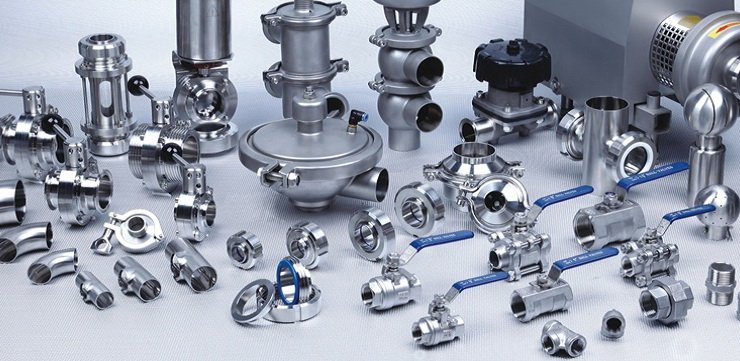The industrial pipeline system is designed and developed in accordance with toxicological and sanitary-hygienic regulations. The safety requirements taken into account in its manufacture relate not only to equipment, but also to component parts. Quality control is also food fittings made of stainless steel are subjected to , which can be matched to any pipeline.
Applications
Stainless connecting fittings are a necessary part of the pipeline network, on the reliability of which the serviceability of industrial equipment at the enterprise depends. It is used to smoothly change the bend, turn and branch of pipes, connect to an industrial unit, ensure tightness in straight sections at the joints of individual links of the system.
Branches of the manufacturing sector, where connecting fittings are in constant demand:
-
food industry;
-
pharmaceutical industry;
-
utilities;
-
thermal power complexes;
-
chemical industry centers;
-
water transportation companies.
Reliability and excellent performance characteristics guarantee food fittings a long service life even under intense loads. These characteristics allow the connection elements to be used for various purposes in raw material processing plants.
Safety requirements for the production of food fittings
Each type of fittings is manufactured in accordance with sanitary and technological standards. Failure to comply with the requirements leads to chemical or biological contamination of the final product, which negatively affects human health.
Strict requirements are imposed on the material used in the manufacture of food fittings. It must be environmentally friendly, highly durable, resistant to external influences during operation, and not corroded. Stainless steel is capable of ensuring hygiene and safety of production processes.
Steel alloy products:
-
do not deform at high temperatures;
-
tolerate mechanical impact of external factors;
-
do not rust on contact with liquids, food;
-
are used for a long time, maintaining the hygiene of the products.
The production of food fittings is carried out under strict control and according to well-established regulations. The quality of metal and alloys is checked during the incoming inspection process. Such examination reveals samples that are prone to defects and changes in mechanical properties that affect safety. Serial production of products begins after acceptance tests are carried out in accordance with GOST.
The manufacture of fittings for the food industry is trusted by trained personnel with the appropriate qualifications. A prerequisite for work is compliance with the requirements of design documentation, labor protection and safety.
Benefits
- Long period of material exploitation.
- Metal hygiene.
- Practicality and aesthetics of rolled metal.
- Increased metal corrosion resistance.
- High resistance of stainless steel sheet to mechanical influences.
- Ease of processing.
- Environmental friendliness of stainless steel.
- Combination with other materials.
Rolled metal products are actively used in various fields:
- Manufacturing of equipment for the food industry
- Production of advertising structures
- Finishing stairs, columns, facades
- Domestic use
- Finishing of public and residential buildings
- Lift cladding




